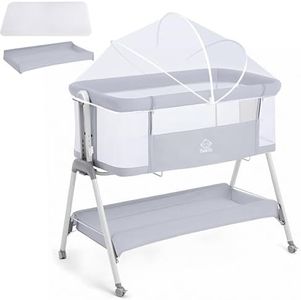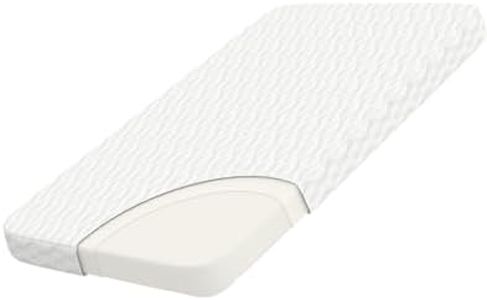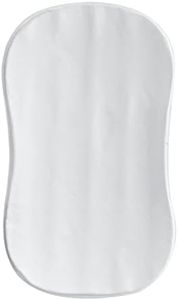We Use CookiesWe use cookies to enhance the security, performance,
functionality and for analytical and promotional activities. By continuing to browse this site you
are agreeing to our privacy policy
3 Best Bassinet Mattresses
From leading brands and best sellers available on the web.By clicking on a link to a third party's website, log data is shared with that third party.
Buying Guide for the Best Bassinet Mattresses
Choosing the right bassinet mattress is important for your baby's safety and comfort. When shopping for a bassinet mattress, you want to focus on factors that ensure a safe sleeping environment, provide support for your baby's developing body, and fit your specific bassinet properly. Take your time to read about each feature, and always remember to check compatibility with your existing bassinet frame. The best choice keeps your baby both comfortable and secure.Size and FitThe size and fit of the bassinet mattress are about making sure it matches the measurements of your bassinet precisely. This is crucial because a mattress that is too small or too big can create gaps where your baby might get trapped, which is unsafe. Bassinet mattresses come in different sizes, so always measure your bassinet and compare it to the mattress dimensions. Ideally, there should be no more than a one-finger gap between the mattress and the bassinet's edge. The right fit depends on your specific bassinet—double-check your manufacturer's recommendations to ensure compatibility.
FirmnessMattress firmness means how hard or soft the sleeping surface is. For newborns and infants, a firm mattress is important because it helps to reduce the risk of suffocation and Sudden Infant Death Syndrome (SIDS). Firmness levels range from very soft to very firm, but for bassinets, the recommendation is always for a firm mattress with little to no give when pressed in the center. If you want to be sure, press your hand gently on the mattress; it should spring back and not conform to your hand. Even if you prefer soft bedding for yourself, firmness is safer and more supportive for babies.
BreathabilityBreathability refers to how well air can pass through the mattress material. A breathable mattress allows fresh air to flow, which can help keep your baby cooler and reduce the risk of overheating. It also makes the sleep environment safer if your baby accidentally rolls over. Some mattresses feature mesh sides or use airy foam or fibers for better ventilation. When choosing, look for materials or designs that mention breathability, especially if your home is warm or your baby tends to get sweaty during naps.
Waterproofing and WashabilityWaterproofing and washability describe how the mattress handles spills, leaks, and accidents. A waterproof mattress or cover keeps liquids from soaking into the mattress, making it easier to clean and more hygienic. Washable covers allow you to remove and launder the fabric, keeping the sleeping area fresh. Mattresses can be completely waterproof, have a waterproof layer, or come with a removable cover. Consider how much convenience you need—if your baby spits up often or has frequent diaper leaks, a good waterproof or washable option will save you a lot of effort.
Material and AllergiesThe material of a bassinet mattress affects comfort, durability, and potential for allergies. Common materials include foam, organic fibers, or synthetic blends. Some babies can be sensitive to chemicals, so if allergies are a concern, look for mattresses labeled hypoallergenic, chemical-free, or certified organic. Materials are also important for parents who are eco-conscious or want natural sleeping surfaces for their baby. Choose a material that aligns with your family's needs and values, and always check for any smells or residues when you get your mattress.



